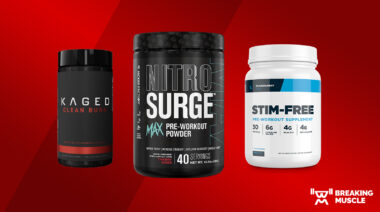When it comes to supplements, most people have heard of the standards, like whey protein and creatine. Most people haven’t heard of glycine, which is surprising, because it’s not new, and the research says it can be very useful.
When it comes to supplements, most people have heard of the standards, like whey protein and creatine. Most people haven’t heard of glycine, which is surprising, because it’s not new, and the research says it can be very useful.
Glycine is the second most abundant amino acid in the human body, and although not an essential amino acid, most people don’t get have enough of it unless they eat a lot of collagen, gelatin or bone broths. Glycine is abundant in animal tissue, just not the parts we normally eat. It is found in the skin, bones, ligaments and tendons; basically everything except muscle meats.
In the past, eating the whole animal was a given. We simply couldn’t afford to waste any part of the animal. This meant we’d get far more glycine in our diet than we do today. Since eating nose to tail has gone out of fashion, most of us have become deficient in glycine.
Okay so we don’t get enough glycine, whats wrong with that?
The Forgotten Amino
Without glycine it’s very hard to make collagen, the main structural protein needed for bone, cartilage, gut tissue, skin, blood vessels, fascia, and teeth development. Since it’s not very abundant in muscle tissue, we often forget about it.
Everyone wants lots of the amino acids needed for muscle protein synthesis, like leucine. But what connects those muscles? Tendons, ligaments, and fascia. We need healthy joints to train effectively. Weight training increases the demand on ligaments and tendons, normally causing them to become thicker and stronger, but only if they have the right nutrients to do so.1,2
We all understand that to get bigger and stronger, we should eat lots of protein. But just as protein supplements with incomplete amino acid profiles make it harder to build muscle,3 you’ll struggle to build strong ligaments, tendons, and healthy skin without the right amino acids. This is where glycine comes in. It helps develop the collagen needed for strong ligaments and tendons.
More Benefits of Glycine
But there are more possible benefits to glycine supplementation, as well. When people took 3g of glycine before bed, they reported deeper, more restful sleep.4 You should already know how important quality sleep is for fat loss, building muscle, and overall health. Poor sleep increases appetite by 30-45%,5 leads to higher levels of muscle loss instead of fat while dieting,6 and reduces testosterone levels.7 Glycine may also increase alertness and concentration throughout the day.8
In healthy adults, 22.5g of glycine boosted growth hormone levels by 360%, though whether this would lead to increased muscle growth is hard to say.9 But as growth hormone stimulates muscle protein synthesis and is important for health and development, if you can boost it naturally, you might as well.
You don’t have to get more glycine through a supplement, of course. You could also increase your intake of collagen-based food, such as gelatin and non-muscle meats. However, glycine is cheap and has a sweet taste, so you can use it to replace sugar in tea or coffee, or add it to a pre-workout formula for a boost in growth hormone and to improve joint health.
References:
1. Kubo, Keitaro, Masanori Morimoto, Teruaki Komuro, Hideaki Yata, Naoya Tsunoda, Hiroaki Kanehisa, and Tetsuo Fukunaga. “Effects of plyometric and weight training on muscle-tendon complex and jump performance.” Medicine and Science in Sports and Exercise 39, no. 10 (2007): 1801-1810.
2. Seynnes, Olivier Roger, Robert M. Erskine, Constantinos N. Maganaris, Stefano Longo, Emilie M. Simoneau, Jean-Francois Grosset, and Marco V. Narici. “Training-induced changes in structural and mechanical properties of the patellar tendon are related to muscle hypertrophy but not to strength gains.” Journal of Applied Physiology 107, no. 2 (2009): 523-530.
3. Volek, Jeff S., Brittanie M. Volk, Ana L. Gómez, Laura J. Kunces, Brian R. Kupchak, Daniel J. Freidenreich, Juan C. Aristizabal et al. “Whey protein supplementation during resistance training augments lean body mass.” Journal of the American College of Nutrition 32, no. 2 (2013): 122-135.
4. Inagawa, Kentaro, Takenori Hiraoka, Tohru Kohda, Wataru Yamadera, and Michio Takahashi. “Subjective effects of glycine ingestion before bedtime on sleep quality.” Sleep and Biological Rhythms 4, no. 1 (2006): 75-77.
5. Nedeltcheva, Arlet V., Jennifer M. Kilkus, Jacqueline Imperial, Kristen Kasza, Dale A. Schoeller, and Plamen D. Penev. “Sleep curtailment is accompanied by increased intake of calories from snacks.” The American Journal of Clinical Nutrition 89, no. 1 (2008): 126-133.
6. Nedeltcheva, Arlet V., Jennifer M. Kilkus, Jacqueline Imperial, Dale A. Schoeller, and Plamen D. Penev. “Insufficient sleep undermines dietary efforts to reduce adiposity.” Annals of Internal Medicine 153, no. 7 (2010): 435-441.
7. Leproult, Rachel, and Eve Van Cauter. “Effect of 1 week of sleep restriction on testosterone levels in young healthy men.” JAMA 305, no. 21 (2011): 2173-2174.
8. Yamadera, Wataru, Kentaro Inagawa, Shintaro Chiba, Makoto Bannai, Michio Takahashi, and Kazuhiko Nakayama. “Glycine ingestion improves subjective sleep quality in human volunteers, correlating with polysomnographic changes.” Sleep and Biological Rhythms 5, no. 2 (2007): 126-131.
9. Kasai, Kikuo, Masami Kobayashi, and Shin-Ichi Shimoda. “Stimulatory effect of glycine on human growth hormone secretion.” Metabolism 27, no. 2 (1978): 201-208.






